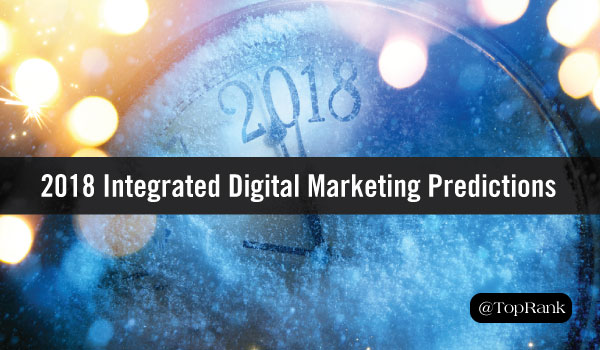Source: Online Marketing Blog – TopRank®

The new year is barely underway and already we’re already seeing significant shifts in digital marketing.
Facebook recently announced their decision to favor friends over brands in news feeds and YouTube has tightened the reins on what channels can be monetized. And this is just within the first few weeks of the year.
Undoubtedly, digital marketing tactics like content marketing, SEO, paid, influencer marketing and social media will all face changes in the coming year. Some of which we’ll be able to predict, and some of which we won’t.
However, today’s best marketers know that individual marketing tactics do not stand alone. Which means that integrated, “best answer” digital marketing strategies will reign supreme. That is why instead of focusing our team’s predictions on how individual tactics will evolve in 2018, we’ve uncovered how the role of each tactic will change as part of the overall digital marketing mix.
The State of Digital Marketing in 2018

As we head into the heart of Q1 2018, marketers are just as overwhelmed with tactics as buyers are with content. This paradox of choice at scale incurs costs that range from dissatisfied customers to ineffective marketing programs.
With increasing demands, fewer resources and greater complexity in marketing that now includes smart speakers, VR/AR, IoT, AI and all forms of disruptive technology, marketers are looking for the universal truths that will keep them on track and effective.
In my book, Optimize, I talked about a customer centric approach to digital marketing that emphasized search, social and content. The truths about how customers engage content to make decisions outlined then are equally true in 2018 and for nearly any kind of platform.
Those content truths are: discovery, consumption and action.
Discovery: Where do buyers look for solution information? What do they say to their Echo or Google Home device? What do they search for on their phone or tablet? What sources do they subscribe to for updates on their smart watch? Of course laptop, tablet and mobile search and social media behaviors are still relevant.
Consumption: What are your buyers’ preferences for engaging with the content they find? Do they read/watch/listen on the discovery platform or save/subscribe for later? Are there preferences for experiencing or interacting with content vs. simply read/watch/listen? Images vs. videos vs. audio vs. interactive on various devices is still relevant.
Action: What triggers will inspire action? Do buyers need content personalized on the fly or are they willing to exchange contact information to be fed personalized content? What will it take to motivate share, subscribe, inquire, transact or refer? All still relevant.
Marketers in tune with truths about how customers find, engage with and take action on information will reveal whatever technology, platform, media format and experience buyers need. As part of an ongoing effort to optimize marketing with a customer focus, these truths can help architect successful marketing programs in 2018 and for years to come.
Content Will Experience a Shift in Focus

There’s a distinct movement taking place in content marketing, with the focus increasingly shifting from quantity to quality. With so much volume out there, it only makes sense to spend our time creating fewer assets that will truly stand out, as opposed to larger amounts of unremarkable material. Since content is already integrated with basically every aspect of a comprehensive digital marketing strategy (or should be at least), I foresee this change in mindset applying to every corner — social, paid media, lead nurturing, data analysis, and so forth.
The Impact of Artificial Intelligence

For years marketers have been talking about the importance of customer experience. And for years, marketers have struggled to uncover the information that makes it possible to create a stellar customer experience.
The game changer in 2018? The emergence of Artificial Intelligence.
In 2017, AI finally began to become more mainstream which allowed platforms to begin harnessing its true power for marketing. In 2018, it will become essential that marketers use data collected by AI to make smarter marketing decisions that will allow them to personalize content, create more data informed social media marketing plans and better target SEO keywords.
SEO & UX Will Overlap

What does UX and good design have to do with SEO? Good UX keeps people on the page when they arrive to your site. The same holds true for good copywriting. It’s a one-two punch as people’s search process involves…
Peter Bordes Jr
Founder & Managing Partner Trajectory Ventures. Lifetime entrepreneur, CEO, Board Member, mentor, advisor and investor.
Obsessed with the infinite realm of possibility in disruptive innovation driving global digital transformation in technology, cloud-based infrastructure, artificial intelligence, data, DevOps, fintech, robotics, aerospace, blockchain and digital media and advertising.

